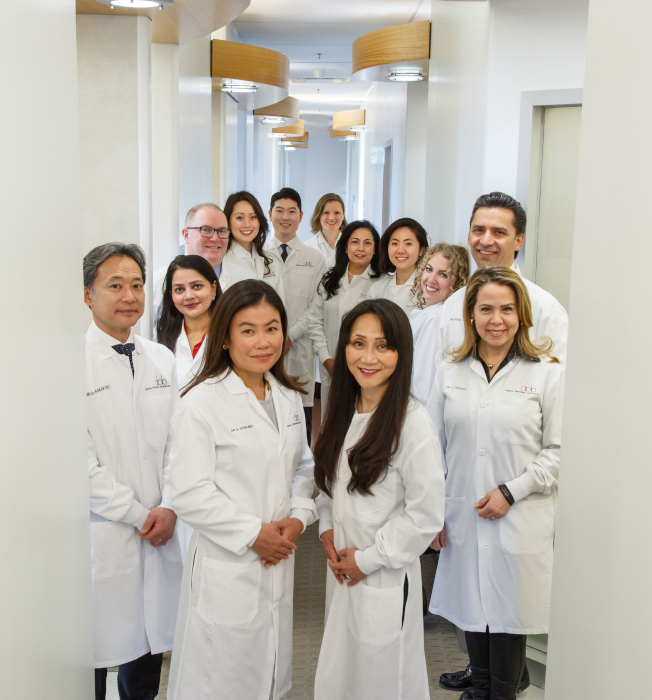
Peri-Implantitis And LAPIP Treatment
Peri-implantitis begins as a bacterial infection that forms around dental implants. In many ways, it is similar to gum disease in that it causes damage to the gums and teeth around it. In the early stages of Peri-Implantitis, the symptoms are relatively mild. Often you will notice inflammation and sensitivity around the gums. The longer the infection goes untreated the more serious the side effects become. Ultimately, dental implants can be lost and bone structure damaged.
It is crucial to have an experienced and detail-oriented periodontist oversee your dental implant procedures from start to finish. At Dental Partners of Boston, we go to great lengths to minimize bacterial exposure during procedures. Our definition of success is not just having you walk out of our office with a great smile, but being happy with that smile for years to come.
Why Choose Us
We are a group of award-winning dentists that covers a full range of specialties.
Our dynamic team approach guarantees you the very best care we have to offer.
We are all committed to excellence and exceeding the expectations of our patients.
What To Watch For After Dental Implants?
If you have had dental implants, it is essential to be aware of the risks. While it is rare for our patients to experience post-op infections, a variety of circumstances can introduce harmful bacteria into the gums around dental implants. Knowing what to watch out for and scheduling a consultation as soon as you notice any of these symptoms will significantly improve your chances of a healthy recovery.
- Inflammation causes redness, swelling, and pain in the gum tissue around the implants.
- Receding gum line. The periodontal “pocket” around the implant grows bigger and deeper.
- Exposure or visibility of the implant threads.
- Loosening of the implant.
- Pus discharge from within the gums around the implant. It may be a very unpleasant taste rather than something you see.
- Bone deterioration is usually unseen but painful. It often feels like soreness in the jaw.
- Infected gums cause bleeding. There are no situations where bleeding gums are healthy.
- Swollen or tender lymph nodes around the neck or armpits.
What to Do
If you feel that your daily life is affected by pain or discomfort around your dental implants, call us immediately to schedule an appointment. Pain or sensitivity while chewing, drinking, exercising, or moving your head into different positions, headaches, soreness, or stiffness in the jaw is not healthy. These symptoms may indicate a problem and need to be looked at by a periodontist as soon as possible.
It is important to remember that while these symptoms are real risks, they only happen when left untreated for significant amounts of time. When caught early and provided proper supervision, peri-implantitis can be treated before causing discomfort or embarrassment.


My doctor brought in the Endodontist and Oral Surgeon in a carefully choreographed treatment plan that was thoroughly discussed and approved by me after explanations about the rationale and timing. Do not hesitate to pick up the phone and put your teeth in the hands of Dental Partners.


What Are The Causes Of Peri-Implantitis?
There are three significant catalysts for peri-implantitis:
Prior Disease
Patients affected by a disease that affects the whole body are at a higher risk of peri-implantitis. If you have diabetes or another systemic illness, consult with your dentist about dental implants. At Dental Partners of Boston, we understand how these diseases affect peri-implantitis, and we can adjust our treatment accordingly. Additionally, if patients have ever had a different type of mouth infection similar to peri-implantitis – they may be at a higher risk. Bring it to your dentist’s attention if you have ever contracted periodontitis extensive gum disease or other bacterial mouth infections.
Oral Hygiene
Bacteria and food particles that gradually accumulate around dental implants and gum lines cause peri-implantitis. Careful and consistent dental care minimizes and eliminates harmful pathogens found in plaque and tartar. As with most other dental conditions, smoking, alcohol, and drug use make peri-implantitis worse. Consult our periodontist during your next appointment for more information on how to adopt healthy dental habits.
Parafunctional Habits
These are involuntary habits you may have. They can be due to malformation of part of your body or a nervous tick. They can even occur unconsciously during sleep. Habits like grinding your teeth in your sleep, poorly positioning your teeth when closing your jaw, nail-biting, and others.
How We Treat Peri-Implantitis
At Dental Partners of Boston, our long-term goal is to stop the progression of bone loss and keep your implants in place. In addition to thorough cleaning of the infected area with the proper dental tools, your periodontist will often prescribe antibiotics to kill off the remaining unhealthy bacteria within your gums and bone. Our doctors may apply antibiotics directly to the implant itself.
Most severe cases of peri-implantitis require the removal of the implant and bone grafting to replace the damaged bone. To do this, traditionally, your periodontist needs to open your gums to fully cleanse the area of the infection. The doctor makes sure that all the infection is eliminated before grafting new bone onto the implant. Most often this means strong antibiotics.
Having a team of specialists from Dental Partners of Boston on your side who lead the industry in advanced procedures, techniques, and methods can significantly improve your chances of success.
LAPIP Treatment for Peri-Implantitis
At Dental Partners of Boston, we offer a less-invasive treatment for peri-implantitis: LAPIP which is similar to LANAP. This state-of-the-art laser therapy can selectively destroy the bacteria, diseased tissue, pathologic proteins, and titanium corrosion contaminants that cause peri-implantitis while leaving your healthy tissue intact. This helps you to heal quickly and maintain your dental implant investment.
LAPIP treatment is a patient-friendly solution, and studies show that 95% treated with LAPIP have displayed significant improvement. LAPIP gets rid of the infection and actually helps the bone to grow back.
After your investment in dental implants, it is important to take care of your oral health and avoid peri-implantitis. We are dedicated to helping you achieve the results that you desire with our excellent implant procedures and compassionate follow-up care.
Schedule My Appointment


Can Any Periodontist Treat Peri-Implantitis?
Our team of periodontist specialists treats many patients suffering from this condition. Unfortunately, many of our patients were treated by less skilled periodontists or at “affordable” treatment centers. Dental implant correction should be done by a periodontist who routinely performs this procedure.
Occasionally, we find a loose abutment screw not appropriately placed, or broken. Patients with a heavy bite can cause this to happen. Heavy biters need to have their crowns appropriately designed by an experienced professional from the beginning to protect the implants. How the crown is made is extremely important to the longevity of the dental implant in the bone. Patients often view this step as minor, but it is significant. Some low-budget implants have poorly designed screws or have micro motion when you chew.
Call Today To Schedule A Consultation
The difference between experienced specialists and an average periodontist cannot be understated. We encourage you to come in and visit with our friendly team and see for yourself what a difference that can make. Our focus is on you and making sure you have the best possible treatment available in the greater Boston area. Your long-term well-being is our success. Schedule an appointment today.
Procedure Doctors


Our Locations
Prudential Center
800 Boylston St., 2nd Floor
Boston, MA 02199
Charles River
50 Staniford Street #303
Boston, MA 02114
Fort Point
46 Farnsworth Street
Boston, MA 02210









